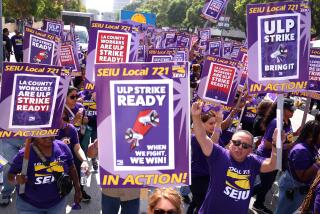Judge May Back City in Police Dispute : Labor: A ruling on the forced imposition of a union contract for Long Beach officers has been postponed until a hearing Jan. 22.
- Share via
LONG BEACH — A court hearing last week did little to end the contract shoot-out between city management and the police union, although a temporary truce will remain in place for another month.
While she indicated during a Los Angeles hearing on Thursday that she will side with the city, Superior Court Judge Dzintra I. Janavs postponed until Jan. 22 a ruling on whether city management can impose a new contract on the 610-member police union without the union’s consent. In the meantime, the city has been barred from carrying out the new contract, which the union complains is being forced upon them.
Whatever Janavs’ ruling, however, an appeal is expected. “I’m sure this will get decided by the state Supreme Court,” union attorney Mike Hannon said. “This is probably a year or two away from resolution,” observed Mike Tracy, president of the Long Beach Police Officers Assn.
Deciding that the city had not given the union sufficient notice that it was going to declare an impasse in the nine-month-old bargaining talks and adopt its final contract offer, Dzintra ordered the city to give that offer to the union to allow the membership to vote.
Although that opens the door for an agreement that would end the labor dispute, Tracy predicted that the contract would be overwhelmingly rejected unless the city makes substantial changes.
“We will make some modifications (in our position) and see if there is any movement from them,” he said.
City human resources Director William Storey held out little hope of further bargaining by the city, saying the city’s offer could not change unless the City Council modifies its position.
The court case revolves around the City Council’s decision last month to adopt the city’s final contract offer. Arguing that such action violates the so-called evergreen clause of their last contract, the union asked Janavs to prohibit the city from imposing its final contract position.
The evergreen clause stated that the old contract would remain in effect until either July of this year or until both sides agreed upon a new contract, whichever was later. “Now they just pull the rug out from under us and say we didn’t mean to do this. They shouldn’t be allowed to do that,” Hannon argued to the judge.
Such evergreen clauses, which the police union has had in its contracts for a decade, are rare. Attorneys said there are no pertinent California court rulings, and the two sides disputed interpretations of federal labor law cases that touched on the issue.
Janavs, saying she had “given this case an awful lot of thought,” agreed with the city’s arguments that federal labor law indicates that an open-ended contract can be terminated by either side, as long as reasonable notice is given. She decided, however, that the city had not given reasonable notice because it declared an impasse only a week after announcing that it planned to do so.
City management insists that staffing changes are necessary to run the Police Department more efficiently and has demanded a number of changes in personnel policy that have been bitterly fought by the union.
“They may ram it down our throat, but we’ll throw it back on them,” declared Tracy, who reiterated that the union is not planning any job actions. Instead, he said the union is launching a publicity campaign aimed at rallying public support for their cause.
“We feel the matter at this point in time has to be taken to (the public) . . . We’re not going to go away. We’re not going to roll over and say this is a great deal and say we’re taking this.”
More to Read
Sign up for Essential California
The most important California stories and recommendations in your inbox every morning.
You may occasionally receive promotional content from the Los Angeles Times.











